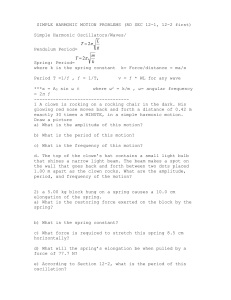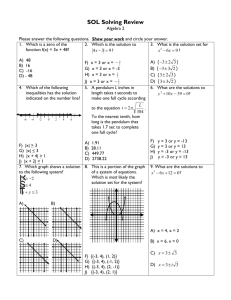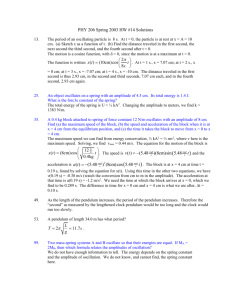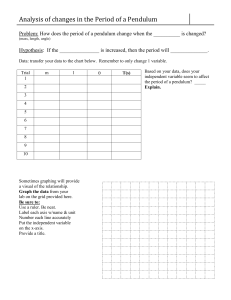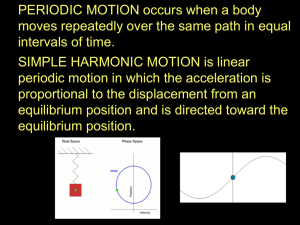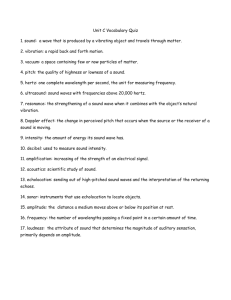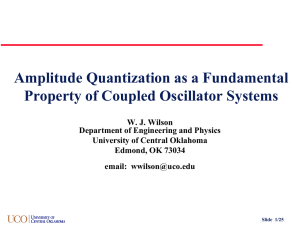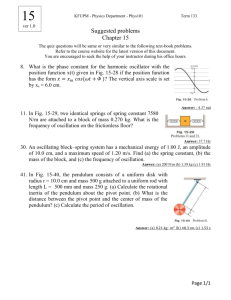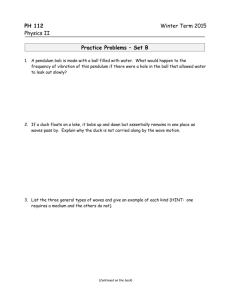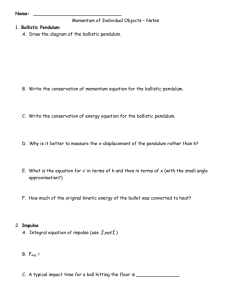answershoproblems
advertisement
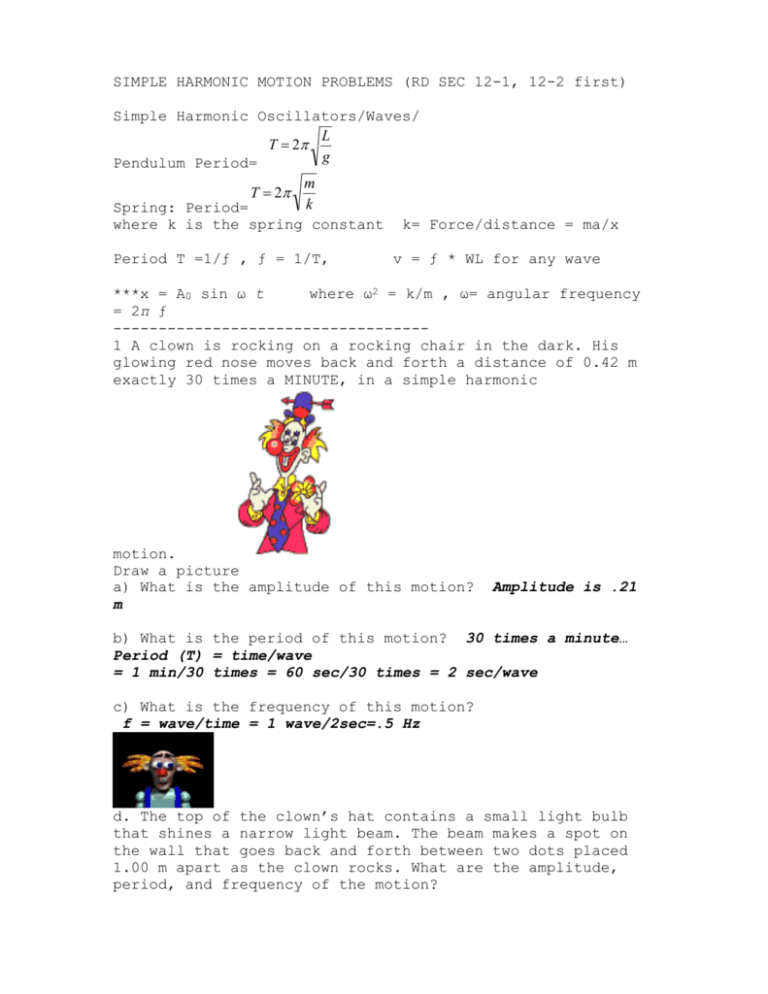
SIMPLE HARMONIC MOTION PROBLEMS (RD SEC 12-1, 12-2 first) Simple Harmonic Oscillators/Waves/ L T 2 g Pendulum Period= m k Spring: Period= where k is the spring constant T 2 Period T =1/ƒ , ƒ = 1/T, k= Force/distance = ma/x v = ƒ * WL for any wave ***x = A0 sin ω t where ω2 = k/m , ω= angular frequency = 2π ƒ ----------------------------------1 A clown is rocking on a rocking chair in the dark. His glowing red nose moves back and forth a distance of 0.42 m exactly 30 times a MINUTE, in a simple harmonic motion. Draw a picture a) What is the amplitude of this motion? m Amplitude is .21 b) What is the period of this motion? 30 times a minute… Period (T) = time/wave = 1 min/30 times = 60 sec/30 times = 2 sec/wave c) What is the frequency of this motion? f = wave/time = 1 wave/2sec=.5 Hz d. The top of the clown’s hat contains a small light bulb that shines a narrow light beam. The beam makes a spot on the wall that goes back and forth between two dots placed 1.00 m apart as the clown rocks. What are the amplitude, period, and frequency of the motion? Period and Frequency are the same! (T = 2 sec, f= .5 Hz) Amplitude is 0.5 m 2) a 5.00 kg block hung on a spring causes a 10.0 cm elongation of the spring. a) What is the restoring force exerted on the block by the spring? F restoring = Weight = mg = 5 (9.8) = 49 N b) What is the spring constant? K = F/x = 49 / (.1 m) = 490 N/m c) What force is required to stretch this spring 8.5 cm horizontally? F=kx = 490 (.085)=41.65 N d) What will the spring’s elongation be when pulled by a force of 77.7 N? F= k x 77.7 = 490 x x = .1586 m = 15.86 cm e) According to Section 12-2, what is the period of this oscillation? T = 2pi sqrt ( m/k) T = 2 * 3.14159* sqrt (5 / 490 ) = .6347 sec Pg. 451 Sec Review: 1) Two mass-spring systems vibrate with simple harmonic motion. If the spring constants of each system are equal and the mass of one is twice that of the other, which system has a greater period? The one with twice the mass has a greater period by sqrt(2) =1.41 times 2. A child swings on a playground swing with a 2.5 m long chain. a) What is the period of the child’s motion? for a pendulum T = 2*pi*sqrt (l/g) = 2*3.14*sqrt(2.5/9.8) T=3.1735 sec/swing b) What is the frequency of the vibration? f = 1/T = 1/3.17=.315 swings/sec=.315 Hz 3. A pendulum swings from maximum displacement on one side of equilibrium to maximum displacement on the opposite side of equilibrium. If the pendulum swings through a total of 24°, what is the amplitude of this vibration? Amplitude = 12 ° Sketch a graph of how the horizontal displacement and velocity would change over time. Displacement = cos curve, Vel= sin curve **Honors* Find the equation that shows this. 4. The reading on a metronome indicates the number of oscillations per minute. What are the period and frequency of the metronome’s vibration when the metronome is set at 180? 180 beats/min = 180 beats/60sec = 3 beats/sec = 3 Hz By what factor should the length of a simple pendulum be changed if the period of vibration were to be tripled? A) 3 B) 1/3 C) 9 D) 27 A pendulum with a mass of 0.1 kg was released. The string made an angle of 7 ° with the vertical. The bob of the pendulum returns to its lowest point every 0.1 seconds. What is the period, frequency, amplitude? Amplitude = 7°, T = 0.2 seconds, f = 1/.2=5 Hz The pendulum is replaced by one with a mass of 0.3 kg and set to swing at a 15 ° angle. How do the period and frequency change? Why or why not? T and f do not change…. Period of a pendulum is NOT affected by mass or amplitude…. If this pendulum was set to keep time and then brought to the moon ( gravity is 1/6th of Earth), what property would you have to change to make sure it kept the same accurate time? Period is affected by length, you would need to change the length by 6 (longer) *** Honors**By how much?
